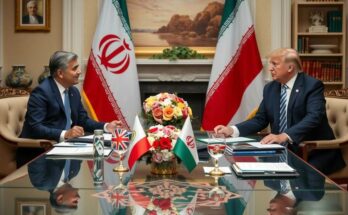The victory of Yamandú Orsi in Uruguay is celebrated in Brazil, signaling a potential strategic alliance against Javier Milei’s ideology in Argentina. Brazilian insiders predict closer cooperation within Mercosur and other organizations, facilitated by Mujica’s influence on Orsi. With Brazil, Uruguay, and Bolivia aligning against divergent political ideologies, there emerges a renewed sense of purpose in South America.
In the wake of Yamandú Orsi’s recent electoral triumph in Uruguay, there is palpable optimism within Brazilian political circles regarding potential collaborations to counter the ideology of Argentina’s Javier Milei. The victory has been highly celebrated in Brasília, where government insiders foresee a significant shift towards closer political engagement and cooperation among South American nations. This aims to foster strong alignments against divergent ideologies proliferating in the region.
One key aspect to note is the anticipated influence of former Uruguayan President José Mujica, regarded as a mentor to Orsi, on his policy decisions, particularly regarding joint initiatives within Mercosur. Lula, the President of Brazil, was among the earliest to extend congratulations to Orsi following his victory, indicating the importance of this development for Brazil’s foreign relations strategy.
Furthermore, a Brazilian diplomat highlighted the collective alignment of governments from Brazil, Uruguay, and Bolivia, which marks a strategic pivot against Milei’s rise. While Bolivia, under the leadership of Luis Arce, lacks full decision-making authority within Mercosur, the broader implications of this alliance pave the way for constructive dialogue and cooperative initiatives in regional organizations, including CELAC and the Brasília Consensus proposed by Lula himself. This evolving dynamic suggests a revitalized commitment to shared political objectives within South America, transcending prior ideological divides.
Yamandú Orsi’s electoral victory in Uruguay signifies a potential shift in the political framework of South America, especially concerning the ideological confrontation posed by Argentina’s Javier Milei. This landscape highlights the importance of regional alliances in addressing new political challenges. Brazil, under the leadership of President Lula, appears poised to strengthen its ties with Uruguay and Bolivia, seeking cohesive strategies within organizations like Mercosur and CELAC to fortify regional solidarity.
In summary, Brazil’s strategic perspective on Yamandú Orsi’s recent victory in Uruguay reflects a broader ambition to unify three key governments against mounting ideological challenges from Argentina. The expected collaborations with Mujica’s guidance and reinforced relationships within Mercosur signify a renewed commitment to regional governance. The prospects for enhanced political dialogue and joint action emphasize a pivotal moment for South America as it navigates the complexities of contemporary ideologies.
Original Source: www1.folha.uol.com.br




